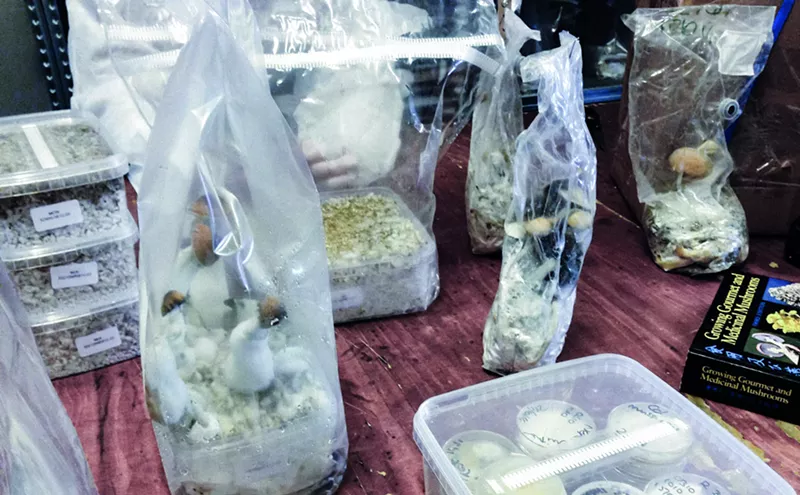Every startup has its challenges, but a cannabis startup comes with additional challenges. Entrepreneurs who want to get in the business face a unique set of hurdles, including ever-changing regulations, legal issues and struggles to set up the right team.
Canopy, a Boulder-based business accelerator program and venture fund for the cannabis industry, chooses ten new enterprises every year for its mentorship and business-building program. The first class graduated in 2015; this year's companies range from a robotics endeavor to a real estate outfit to an eco-friendly packaging firm.
Micah Tapman, managing director of Canopy, is in charge of the team that narrows down the program applicants. "Finding participants is easy and hard," he notes. "It's easy to get a lot of interest; it's hard to find the gems."
We recently sat down with Tapman to find out what he thinks is essential for success in the cannabis industry. Then we added some tips from the Women Grow Leadership Summit earlier this month to compile this list of ten things would-be ganjapreneurs need to know:
1. Your team is key
The main challenge for any company getting started, whether it's in the cannabis field or any other industry, is setting up a balanced management team, Tapman notes. "The team really has to have a bit of diversity, particularly in terms of skill set. They need to combine business and finance with some technical skill, and then some sales and marketing skill. That can be one person if they're a super-person, but more likely that'll be two or three people," he says.
2. Get an attorney
Karyn Wagner, CEO of Paradigm Cannabis, says that the most important thing to do when starting a business is get an attorney — and not just one attorney. You need a lawyer for your business and a personal attorney, and any partners should have their own attorneys as well. "It sounds like overkill," she says, but that is the only way to ensure that everyone's interests are being protected. There's one person looking out for the business's interests, someone looking out for you, and someone looking out for your partner. It's easy to get into this industry with friends or people you're comfortable with, she explains, but it's important to treat your company as a business from the get-go in order to prevent problems or disagreements that can spiral out of control down the line.
3. Impressions matter
This is an extremely relaxed industry; most people can get away with wearing jeans and a T-shirt to work. But Tapman thinks it's important to own at least one good blazer: "You may not want to wear a suit, and that's fine, but [investors] would like to see you show up in a professional way," he says. "For better or worse, impressions matter. When you walk in the door, people are going to judge you from the first second you walk in." Tapman suggests walking the line between showcasing your personality and looking professional: "When you show up, the dreadlocks are fine, but you might want to throw on a button-down shirt."
4. Be authentic
This industry has room for everyone. From the former banker who founded Tokken to the tech and business nerds behind Baker, successful ganjapreneurs have their own strengths and capitalize on past experience. Gail Rand, CFO of ForwardGro, says it's critical to market yourself authentically. There are plenty of people in the industry who fail because they try to be what everyone else thinks they should be; Rand advises that the most important thing you can do for your business is be your best self and bring all you have to the table.
5. If you feel like you don't know what you're doing, that's okay; others have been there
Jane West is one of the most recognizable people and brands in the cannabis space. West has a successful line of bongs and accessories, but she admits to falling into cannabis almost by accident. She started out thinking it'd be fun to host cannabis events, and started doing just that almost as a hobby in 2014, right after recreational marijuana sales started. She attracted attention quickly, and the coverage propelled her to the front of the industry. "I was in the press so much that people were reaching out to me from all over the country and all over the world," she says. "What I was doing, I had only done twice when I got fired. I held two two-hour events. That's it...I had no idea what I was doing."
Keep reading for five more things to know.
6. Consistency is key, especially in an inconsistent industry
"The old rule of thumb of business is, you can make money any time there's consistency," Tapman says. "However, when there's inconsistent regulatory status, it's almost impossible to do any planning, because anytime you do something, you're told you have to change." This is definitely true in the cannabis industry. In October, every edibles company in Colorado had to update its packaging; instead of just displaying the THC logo on packaging, the THC diamond was now required on every individual edible. That meant that every company had to update its molds, and some were forced to discontinue entire product lines. Tapman says it's not only important to have consistency in your business, but also enough capital and flexibility to roll with the punches when your company may be forced to comply with new regulations.
7. Make good connections
Everywhere you go is a networking possibility; you should take advantage of all opportunities. Meg Sanders, CEO and managing partner of BeMindful, says there's immense power in connecting with others. In any industry, who you know can make or break your company — but in cannabis, your connections are what could be the difference between success and failure, she adds.
8. Find ways to maintain your mental health
It's stressful to start a business. It's even more stressful to start a business in an industry that is federally illegal. "There are days I can't get out of bed," says Natasha Irizarry, co-founder and CEO of Stashbox. "Starting a business is hard, and there's an unbelievable amount of stress that comes with being in this industry.... We really need to talk more about mental health." Irizarry, who went through Canopy's accelerator program, says it's important to take time for yourself and engage in good self-care. "I wouldn't be anywhere without my team," she says. "They help me keep going. They help me get up and do this every day."
9. Learn how to navigate the legal market in an illegal industry
Yes, cannabis is illegal at the federal level, but it's legal in many states. Whether you're starting a medical company or a recreational one, it's crucial to know the laws in your state and operate within the regulations of the industry. Despite the challenges of navigating within the legal confines of an illegal industry, there is plenty of room for new businesses in the space. "People underestimate the growth of the industry," Tapman says. "The real issue that's happening is we're creating a new consumer product, and that is going to develop a whole new set of consumers."
10. Failure can be the most valuable lesson
Embarking on a new path will undoubtedly lead to failures along the way. Megan Rogers, founder of Hallaway Dispensary in Maryland, says it's important to fail because that's when you can learn the most useful lessons. But you need to know how to build from failure. Yes, she says, you will run into hurdles — but you can't let those stumbles stop you: Getting up and keeping on is the only way to go.

Audio By Carbonatix
[
{
"name": "GPT - Billboard - Slot Inline - Content - Labeled - No Desktop",
"component": "23668565",
"insertPoint": "2",
"requiredCountToDisplay": "2"
},{
"name": "STN Player - Float - Mobile Only ",
"component": "23853568",
"insertPoint": "2",
"requiredCountToDisplay": "2"
},{
"name": "Editor Picks",
"component": "17242653",
"insertPoint": "4",
"requiredCountToDisplay": "1"
},{
"name": "Inline Links",
"component": "18838239",
"insertPoint": "8th",
"startingPoint": 8,
"requiredCountToDisplay": "7",
"maxInsertions": 25
},{
"name": "GPT - 2x Rectangles Desktop, Tower on Mobile - Labeled",
"component": "24956856",
"insertPoint": "8th",
"startingPoint": 8,
"requiredCountToDisplay": "7",
"maxInsertions": 25
},{
"name": "Inline Links",
"component": "18838239",
"insertPoint": "8th",
"startingPoint": 12,
"requiredCountToDisplay": "11",
"maxInsertions": 25
},{
"name": "GPT - Leaderboard to Tower - Slot Auto-select - Labeled",
"component": "17676724",
"insertPoint": "8th",
"startingPoint": 12,
"requiredCountToDisplay": "11",
"maxInsertions": 25
}
]













